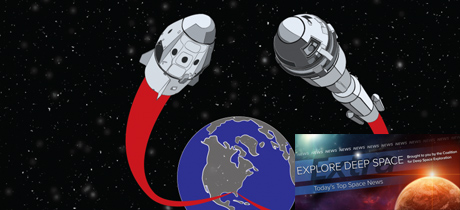In Today’s Deep Space Extra… NASA adjusts development schedule for first Gateway element in response to December/January partial U.S. government shutdown. Bipartisan legislation is filed to extend NASA oversight of the International Space Station (ISS) from 2024 to 2030.
Human Space Exploration
Shutdown to delay first element of NASA’s lunar Gateway
SpaceNews.com (2/27): In procurement documents filed this week, NASA states that the record 35-day December/January partial U.S. government shutdown is responsible for slowing work on the Power and Propulsion Element (PPE), which is the first element of the planned human tended, lunar orbiting Gateway. A contract award to begin PPE development has been pushed from March to the end of May. The target launch date has shifted as well, from September 2022, to no later than December 31, 2022.
SpaceX Demo-1: Reviews provide GO for launch
NASA Commercial Crew Program (2/27): Follow on readiness assessments confirm plans to launch the SpaceX Demo-1 mission Saturday at 2:49 a.m., EST, from NASA’s Kennedy Space Center (KSC). The test flight will send an uncrewed Dragon spacecraft on an automated trip to the International Space Station (ISS) for a weekend docking.
Boeing Starliner preps for both demo launch and pad abort test
Coalition Member in the News – Boeing
Orlando Sentinel (2/27): While NASA Commercial Crew Program partner SpaceX is preparing for the uncrewed test launch of its Crew Dragon capsule to the International Space Station (ISS) early Saturday, Boeing, the program’s second commercial partner, is also preparing for critical test flights. There’s an uncrewed orbital test flight in April, followed by a pad abort test, also from Florida’s space coast, in May. Each of the efforts is intended to restore a U.S. human space transportation capability lost as NASA’s shuttle fleet was retired in 2011.
U.S. Sen. Cornyn files measure to extended U.S. operations on Space Station to 2030
Houston Chronicle (2/27): As he pledged several days ago in Houston, U.S. Sen. John Cornyn, of Texas, joined by U.S. Sen. Gary Peters, of Michigan, has filed bipartisan legislation, the Advancing Human Spaceflight Act, that would extend NASA oversight of the International Space Station (ISS) from 2024 to 2030. The White House has called for a transition of Space Station oversight to the commercial sector by 2025 as part of a strategy to advance human deep space exploration, starting with a sustained return to the Moon. Supporters believe the NASA and the commercial sector need more time to carry out a transition.
Space Science
The NASA space telescope the Trump Administration tried to kill could ‘find 1,400 new planets’
Forbes (2/26): An Ohio State University study suggests the cost and technically challenged Wide Field Infrared Space Telescope (WFIRST), which is to be a companion to the James Webb Space Telescope (JWST), could greatly increase the number of extra solar planet discoveries. So far, Congress has held off on efforts by the Trump Administration to cancel WFIRST.
Editor’s Note: Cancellation of WFIRST was first introduced in the 2019 Presidential Budget Request (PBR) which was presented in February of 2018.
Setback for Israeli lunar lander as computer glitch prevents scheduled maneuver
Times of Israel (2/26): A computer issue on Monday evening caused an Israeli lunar spacecraft to miss a scheduled adjustment in its trajectory in route to the Moon. The maneuver by the Israel IR Beresheet craft was postponed after the space vehicle’s on-board computer executed an independent restart. As a result, the craft automatically canceled an engine burn scheduled to keep it on track for an April lunar landing. If successful, Beresheet, which was launched February 21, will make history twice: as the first private-sector landing on the Moon, and the first from Israel.
Universe Today (2/27): There’s a new candidate for most distant object in the solar system, FarFarOut, which is 140 times further from the sun than the Earth. Credit for the discovery goes to Scott Sheppard, astronomer with the Carnegie Institute for Science in Washington D.C.
Other News
Op-ed | Sustainability on Earth depends on our exploration of space
SpaceNews.com (2/26): Protection of the Earth’s environment and the push to explore space with humans go hand in hand, according to an assessment from H.E. Ahmad Belhoul Al Falasi, chair of the United Arab Emirates (UAE) Space Agency.
European officials reject SpaceX complaints over launch subsidies
Reuters (2/26): European officials are rejecting a claim from SpaceX that its launch services are unable to compete in the European market because of government subsidies. They countered that a larger U.S. market is closed to the European Ariane 5 rocket.
OneWeb’s first satellites are launched into orbit for global internet constellation
Geekwire.com (2/27): A Soyuz rocket launched from the European Space Agency (ESA) launch complex in French Guiana on Wednesday placed the first six satellites for the OneWeb broadband data constellation into a 625 mile high Earth orbit. The constellation is to connect users on a global scale.

